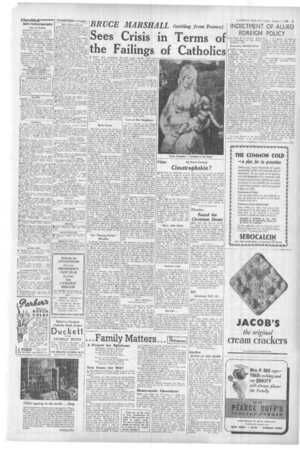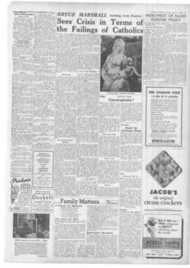Page 3, 2nd January 1948
Page 3

Report an error
Noticed an error on this page?If you've noticed an error in this article please click here to report it.
Tags
Share
Related articles
Catholics And World Affairs Xii (conclusion)
William Teeling, M. P. You Have
How The Flu Led Me To St Augustine
Home Alone
The Priesthood Leads First To Calvary, And Then On To A...
Sees Crisis in Terms of
the Failings of Catholics I HAVE been postponing the writing of this article as long as possible, because events are moving fastly in France these days, and I wanted to be as up-to-date as I could. But now I realise that' whether de Gaulle or Thorez comes out on top. the French crisis will remain a concentrated little reflection of the world crisis: a crisis of Christianity.
To readers of the aseptically agnostic weeklies this will no doubt seem an over-simplification, like saying that if people didn't behave badly they would behave well. Yet, despite highbrow sneers, the problem remains essentially a moral problem: if the world is sick to-day it is not because everybody cannot be persuaded to hold the same views about the Kremlin or Picasso; rather is it because everybody cannot be induced to practise those elementary Christian benevolences which alone will save our civilisation from extinction. The French crisis in particular is a moral crisis, because it is" due to an excess of hard hearts rather than to a shortage of hard currency.
Basic Cause
The basic cause of the trouble is, of course, the black market which has sent prices so high that the workers have very great difficulty in making both ends meet; but the basic cause of the black market is the desire of peasants, wholesalers and retailers to make excessive profits, and if that is not a crisis of Christianity in an at least nominally Catholic country, then Tommy Handley's deep-sea diver was a New York fireman.
Only the other day the arrival of a sugar ration in the shops was announced. Despite the fact that we both had sugar coupons, my wife was unable to obtain our ration owing to the fact that the retailers in our district were selling the sugar under the counter at about ten times the official price. We finally obtaMed our ration at the legal price through the good offices of a friend, whose retailer knew her well and was willing to " oblige " her.
Yet our parish church is choc-abloc for 14 Masses every Sunday, and we have a Cure who is both eloquent and persuasive. It is true that many of the faithful have not conspicuously spiritual faces, but they do go to church, which is more than can be said of their Anglican counterparts. There is no doubt that more Frenchmen hear Mass on Sundays that Britons attended Matins or Nonconformist services. In Paris at least 20 per cent. of the population go to church every Sunday and that is more than can be said, I think, for the Protestant population of London. I leave aside deliberately the worship of Catholics in Britain and Protestants in France, since both are religious minorities and their devotion or lack of it cannot in either case be taken as representative of the national attitude to religion.
The " Playing Fields" Morality to Britain, however, ration tickets are honoured and the necessities of life arc not sold under the counter. In Britain the dairyman does not laugh at you, as French dairymen do, when you attempt to purchase your ration of butter at the legal price. Of course the explanation may be that no French dairymen go to Mass and that all British dairymen go to choral Matins and that this important graph was not disclosed by the general statistic which I have attempted above.
It is not, however, only French dairymen who attempt to charge more than the legal price for their goods; it is practically every French shopkeeper with anything to sell from a bolster to a balloon tyre. And some of those dishonest French shopkeepers probably go to Mass on Sundays just as some of their honest British opposite numbers probably give the Litany the go-by on Wednesdays.
Can it be that the rugby scrum and the cricket pitch teach commercial morality more persuasively than the Eldest Daughter of the Church? Can it be that the Member of Parliament was right after all, when he said in the debate in the House on the Education Bill, that, from what he had observed of Catholic education on the Continent, he didn't understand why the Archbishops and Bishops were making such a fuss about preserving it in England?
Well, I for one sought admittance to the Catholic Church precisely because I considered that she inspired and taught morality much more effectively than the " playing fields of Eton?' I still think that she does so, whether in Caledonia, stern and wild, or in Paris, not quite so stern. I do not believe that the loudest voiced football coach in the world would have succeeded where Fenelon and the Curd of Ars seem, for the moment, to have failed.
But / do believe that we must face the very unpleasant fact that French Catholics arc not quite as good at loving their neighbour as Briii.sh Protestants are.
I do not think, however, that they would have been any better at the job if they had been Scottish Presbyterians or Wesleyan Methodists; although I have the highest respect for both Presbyterians and Methodists, I think that their less disciplined religions would have been even less successful and that, without Catholic, Apostolic and Roman authority, prayer-books as well as lawnmowers might have been selling at black market prices.
Love of Our Neighbour
have referred to the French crisis as a concentrated little reflection of the world crisis. For the crisis from which we are all suffering to-day seems to boil down to an inability simultaneously to love God and our neighbour.
At the risk of heresy, I shall say that I have never quite followed St. John's argument that a man was a liar when he said that he loved God. Whom he had not seen, and didn't love his neighbour, whom he had seen. It is indeed because I have so often seen my neighbour that I occasionally find it so devastatingly difficult to love him. Perhaps the prerevolution Russians saw too much of their neighbours, too. At any rate, however much they may have professed to love God, there is no doubt that their failure to do such e whale of a lot about loving their neighbour as themselves was responsible for the emergence of Communism as a political philosophy.
I am not suggesting that the thousands of obscure French saints who go to Mass and Holy Cornmunion every day do not love their neighbour as well as God or that as soon as they have finished the Stations of the Cross they run out of church to sell, at illicit prices, needles to nuns.
I am, however. very seriously suggesting that the great unlighted tepid cohorts of Conformists who content themselves with the minimum in God's service do not even go as far as that minimum in their neighbour's. Every Frenchman to whom I have spoken agrees that the French crisis is a moral crisis, but it is always other Frenchmen's moral crisis and never his own.
Most Frenchmen blame the Government for their troubles, even as you and I: they do not realise that the Government of a democracy is almost always a microcosm of the electorate and that, if ministers are shiftless and slack, it is generally because those who put them into office are not competent and energetic.
The employer who is responsible for social unrest by paying too small wages and the tradesman who decimates the workers' salaries by his nefarious truck are, however often they go to church, worse Christians than the Communist who disbelieves in revelation: and, what is more, their had example is often responsible for the atheism of the Communist.
Whether the French crisis will end in compromise or civil war I cannot say; but however it ends. and whichever side is victorious, the crisis itself and hence the result will have been brought about by the inability of Frenchmen to observe at least the second of the two great commandments. Personally, I think that the world will find no peace until its inhabitants learn to observe both great commandments, which, quite apart from showing us the way to heaven, provide the only brass tacks with which we can securely nail our carpet down on earth.
BRUCE MARSHALL.
A Sigh For a Drum-beat. By Patrick Doncaster. (Earl, 9s. 4d.) This book reminds one of the recent Odd Man Out film; it captures the atmosphere of Belfast, at its worst, with the same bleak validity. The story is all the author's own, being an account of the varying fortunes of Irish gun-men in the
early days of the war. It is more than a thriller. Only adults should read it.
blog comments powered by Disqus







